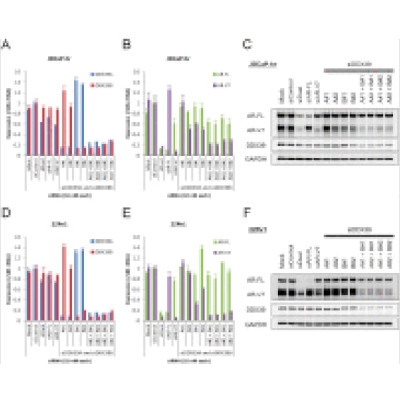Abstract
Mounting evidence suggests that constitutively active androgen receptor (AR) splice variants, typified by AR-V7, are associated with poor prognosis and resistance to androgen deprivation therapy in prostate cancer patients. However, mechanisms governing the generation of AR splice variants are not fully understood. In this study, we aimed to investigate the dynamics of AR splice variant generation using the JDCaP prostate cancer model that expresses AR splice variants under androgen depletion. Microarray analysis of JDCaP xenografts before and after expression of AR splice variants suggested that dysregulation of RNA processing pathways is likely involved in AR splice variant generation. To explore factors contributing to generation of AR-V7 mRNA, we conducted a focused RNA interference screen in AR-V7-positive JDCaP-hr cells using an shRNA library targeting spliceosome-related genes. This screen identified DDX39B as a regulator of AR-V7 mRNA expression. Simultaneous knockdown of DDX39B and its paralog DDX39A drastically and selectively downregulated AR-V7 mRNA expression in multiple AR-V7-positive prostate cancer cell lines. DDX39B was upregulated in relapsed JDCaP xenografts expressing AR splice variants, suggesting its role in expression of AR splice variants. Taken together, our findings offer insight into the mechanisms of AR splice variant generation and identify DDX39 as a potential drug target for the treatment of AR splice variant-positive prostate cancer.
